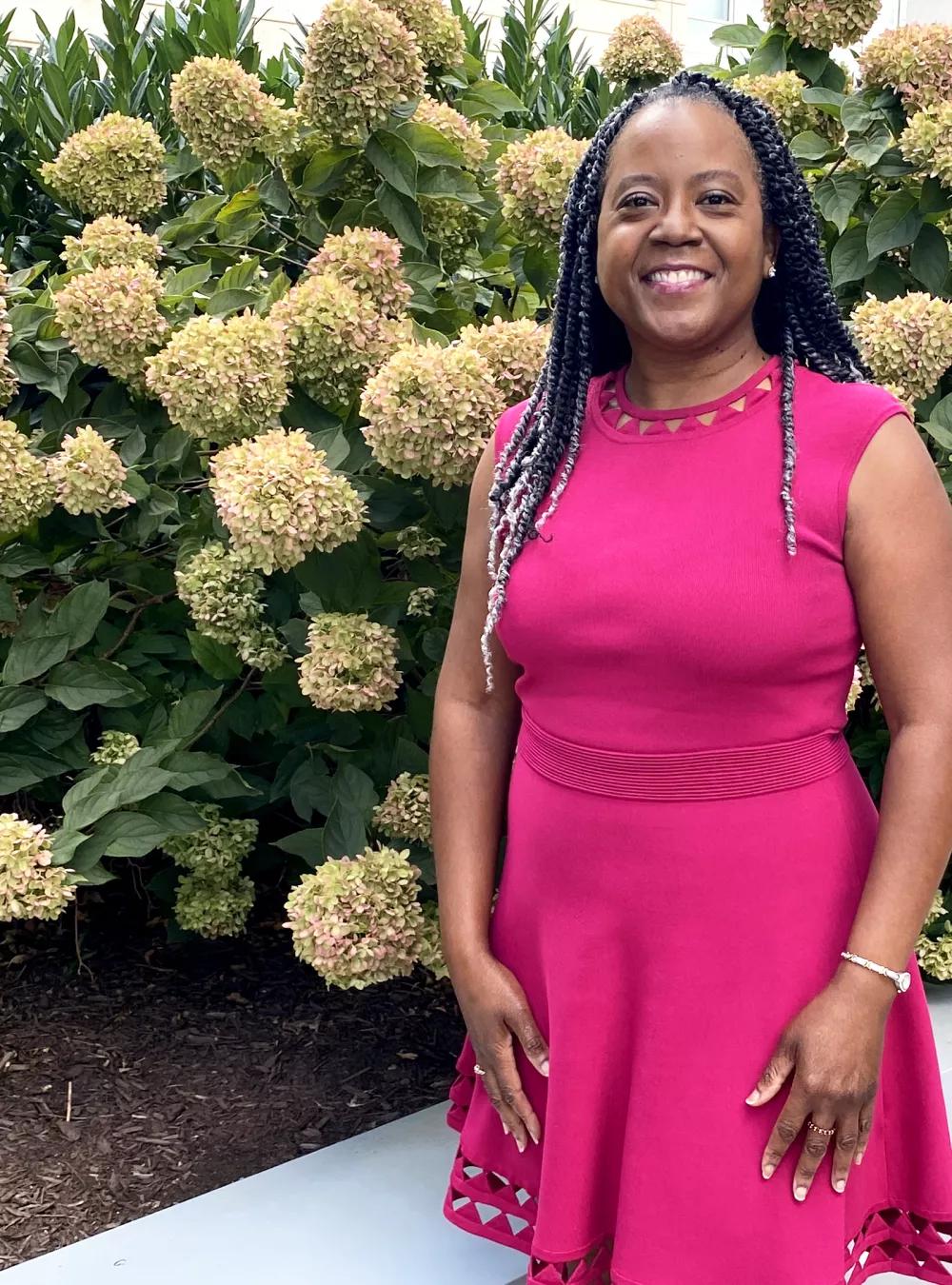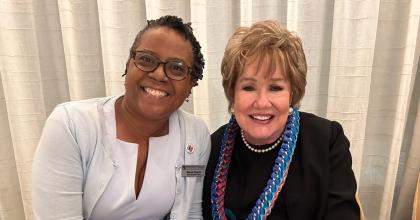For 19 years, Belinda Edwards has made MITRE her home. As she navigates the challenges involved in caring for her aging parents, she’s helping others plan for their own caring journeys.

How a MITRE Cybersecurity Architect Balances Long COVID, Career, and Caregiving
Belinda Edwards smiles when she talks about her childhood—visiting national parks and amusement parks, hanging out with her grandparents. For a moment, she is still the scrappy young girl fetching tools for her father as they repaired the family’s old Ford LTD. She credits these childhood moments with making her the MITRE engineer she is today.
As her parents age, Edwards is trying to meet their unique needs while maintaining her own career. She is not alone.
One of every seven U.S. adults provides some level of unpaid care for adults in their lives. Over 25% have had to take off work for seriously ill family. This National Caregivers Month, MITRE celebrates those who, like Edwards, provide care to previous generations.
A New Mission of Caring

(At left) Edwards with Senator Elizabeth Dole at the Hidden Heroes Fellows dinner in May 2023.
When the COVID-19 pandemic began, Edwards’ family situation deteriorated. Edwards herself developed long COVID, which induced blood clots in both her lungs and legs, as well as pneumonia. Her parents’ infections accelerated their dementia, adding to the challenge. “It was traumatic to care for them when I wasn’t 100%,” she says. “Especially during a pandemic where nobody could be around.”
In the struggle, however, Edwards found a new calling: advocating for caregiving and caregivers. She’s training to become a care coach herself through programs with the Department of Veterans Affairs and the Rosalynn Carter Institute for Caregivers. She has spoken to congressional and ambassadorial staff about the challenges of modern caregiving and was named a fellow and 2022–23 Hidden Hero by the Elizabeth Dole Foundation.
Life on the Road—Then, a Place to Land
Edwards grew up an only child in a close-knit, multigenerational family. A diligent student, she found a passion in computer science. Designing code and system architecture for the Internal Revenue Service and IBM enabled her to travel extensively but also kept her far from home and family. “I was traveling 47 weeks a year,” she explains. “It was exciting … until it wasn’t. While my friends were getting married and having kids, all I was doing was catching the next plane.”
There are all sorts of components to caregiving that aren’t really talked about: legal, financial, mental, emotional, and spiritual.
Edwards joined MITRE in 2004 to be near her parents. She intended to stay for just a few years but liked the job that offered flexibility and a variety of new projects with new sponsors. She never wants to leave. “At MITRE, I’m treated like a person, not a number, and I’ve always been able to transition and learn something new,” she says.
Workplace Benefits Help Balance Caregiving and Career
Time brought new challenges. Doctors discovered her father had cancer. He battled through to remission, but just a few years later was diagnosed with dementia. Her mother’s dementia diagnosis came soon thereafter.
At that point, Edwards’ already busy calendar filled with new appointments: oncologists, specialists, therapists, caregivers, nurses. “Time is my enemy,” she says. “I have two people who depend on me, and there are only so many hours in the day.”
But the emotional burden has been heavy. “It’s hard,” she says. “I'm grieving my parents while they’re still here. I also get frustrated because of what they can’t do and, simultaneously, I’m juggling my own care needs without a lot of help.”
She found help from MITRE’s HR Service Center. “The benefits folks were great. They were open to answering my questions and let me know what my options were.”
One of the biggest benefits: more time. MITRE offers caregiver leave, also known as K-Time. This offers up to 12 weeks leave per year, with the first four weeks paid in full. The time can be billed as discrete days, or even hours, to help manage all the doctor appointments.
Accepting Support and Paying It Forward
Our family care partnerships with Care.com and Bright Horizons provide fallback care for Edwards’ parents while she is at work or traveling. With MITRE’s help, Edwards also found a care coach to help manage her parents’ needs.
MITRE’s other advantage: flexible scheduling. “I’ll come in here and work until a parent has an appointment,” she says. “Then I can go pick them up, go to the appointment, drop them off, and try to get back to work.”
At MITRE, Edwards has become a vocal advocate for caregivers, offering “Prepare to Care” trainings and brown bag lunches to help others navigate the challenges she faces. “I was really unprepared for everything,” she says. “There are all sorts of components to caregiving that aren’t really talked about: legal, financial, mental, emotional, and spiritual.”
The classes aren’t just for caregivers, either. She hopes they nudge the older generation to get their affairs in order and make caregiving easier.
“I want to make life easier for caregivers, because I feel like life is hard, hard enough,” she says.
Interested in solving problems for a safer world? Join our community of innovators, learners, knowledge-sharers, and risk takers. View our Job Openings and Student Programs. Subscribe to our MITRE 360 Newsletter.